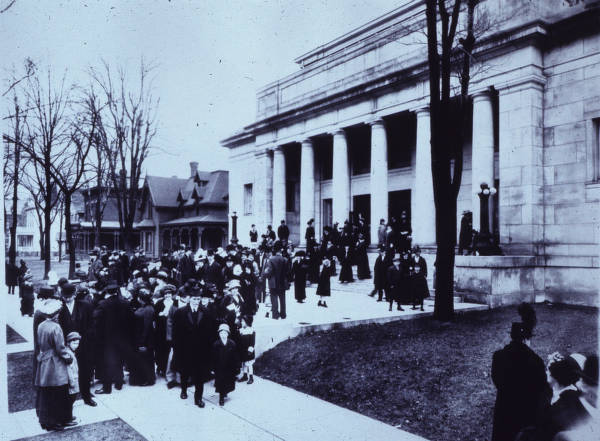In the early 1870s founder Charles Taze Russell organized the International Bible Student’s Association (IBSA), an offshoot of the 19th-century Adventist movement. The group adopted its current name, Jehovah’s Witnesses, in 1931. The Witnesses hold many distinctive beliefs including the rejection of the Trinity, refusal to salute the American flag or participate in the armed services, lack of celebration of Christmas, and refusal to receive blood transfusions. Witnesses attend weekly meetings in Kingdom Halls and canvass new members through house-to-house visitation and distribution of their literature. The Jehovah’s Witnesses are organized under the Watchtower Bible and Tract Society, a publishing house headquartered in Brooklyn, New York.

Early Russellites were known by various names including the Millennial Dawn Church, which appeared in the Indianapolis city directory as early as 1905. By April 1918, the Associated Bible Students sponsored free lectures entitled “The World Has Ended—Millions Now Living May Never Die.” That same month, 20 members of the local IBSA were arrested for distributing the “Kingdom News” bulletin protesting the suppression of another IBSA publication, “The Finished Mystery,” which the federal government had banned as a violation of the espionage law.
The movement continued to grow during the next two decades and by 1938 the city directory listed the first Indianapolis Jehovah’s Witnesses congregation at 725 East 27th Street. Two years later a local Witness was arrested for refusing to salute the American flag. He was charged with desecrating the flag and released on a $100 bond.
In August 1950, local Witnesses again were arrested, this time for holding religious meetings in Brookside Park. They were jailed for violating a city ordinance, which prohibited meetings on park property without the consent of the park board. The next month a judge ruled that the constitutional rights of free speech and assembly superseded local ordinances and the Witnesses could continue to meet.
By 1956, ten congregations of Jehovah’s Witnesses were meeting in the city and local Witnesses were hosting district convention meetings. Indianapolis residents continued to be wary of the Witnesses, with several zoning requests for the construction of new Kingdom Halls denied in the late 1950s. The Witnesses have been victims of religious discrimination across the United States, Canada, and other various countries. However, congregations of other faiths in Indianapolis, including Second Presbyterian, First Congregational, and St. Luke’s Catholic in , faced their own zoning battles in the late 1950s.
During the 1960s and 1970s, the Witnesses expanded their presence in Indianapolis, adding new congregations and hosting district conventions. In 1978 the Witnesses purchased the former Church of Christ Scientist structure at 1201 North Delaware to provide a permanent meeting place for central Indiana Witnesses.
By the 1980s Jehovah’s Witnesses in Indianapolis were estimated to number between 4,000 to 5,000 members. A 1988 newspaper article counted 27 city congregations. As of 1993, the Indianapolis Yellow Pages listed 14 Indianapolis Jehovah’s Witnesses congregations in addition to the Indianapolis Assembly Hall of Jehovah’s Witnesses at 1201 North Delaware. By 2020, eight congregations remained.
The Indianapolis Assembly Hall at 1201 North Delaware was purchased in 2016 by Traders Point Christian Church.

Help improve this entry
Contribute information, offer corrections, suggest images.
You can also recommend new entries related to this topic.